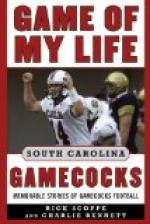The third way of detecting thieves was taught by the fathers and mothers of the slaves. They said no matter how untrue a man might have been during his life, when he came to die he had to tell the truth and had to own everything he had ever done, and whatever dealing those alive had with anything pertaining to the dead, must be true, or they would immediately die and go to hell to burn in fire and brimstone. So in consequence of this, the graveyard dust was the truest of the three ways in detecting thieves. The dust would be taken from the grave of a person who had died last and put into a bottle with water. Then two of the men of the examining committee would use the same words as in the case of the Bible and the sieve, “John stole that chicken,” “John did not steal that chicken,” and after this had gone on for about five minutes, then one of the other two who attended to the Bible and the sieve would say, “John, you are accused of stealing that chicken that was taken from Sam’s chicken coop at such a time.” “In the name of the Father and the Son and the Holy Ghost, if you have taken Sam’s chicken don’t drink this water, for if you do you will die and go to hell and be burned in fire and brimstone, but if you have not you may take it and it will not hurt you.” So if John had taken the chicken he would own it rather than take the water.
Sometimes those whose characters were beyond suspicion would be proven thieves when they tried the graveyard dust and water. When the right person was detected, if he had any chickens he had to give four for one, and if he had none he made it good by promising that he would do so no more. If all the men on the plantation passed through the examination and no one was found guilty, the stolen goods would be charged to strangers. Of course these customs were among the negroes for their own benefit, for they did not consider it stealing when they took anything from their master.
JOSH AND THE CORN.
A man engaged in stripping fodder put some green ears of corn in the fire to roast as the slaves generally do in fodder stripping time, although they were whipped when caught. Before the ears were roasted enough, the overseer approached, and Josh took the ears out with some live coals stuck to them and put them in his shirt bosom. In running away his clothes took fire and Josh jumped into a creek to put it out. The overseer said to him, “Josh, what are you doing there?” He answered, “It is so warm today I taught I would go in de creek to git cool off, sir.” “Well, have you got cooled off, Josh?” “Oh! yes, sir, very much cooler, sir.”
Josh was a very hearty eater, so that the peck of corn flour allowed the slaves for a week’s ration lasted him only a half. He used to lug large sticks of wood on his shoulders from the woods, which was from a mile to a mile and a half away, to first one and then another of his fellow negroes, who gave him something to eat; and in that way he made out his week’s rations.




